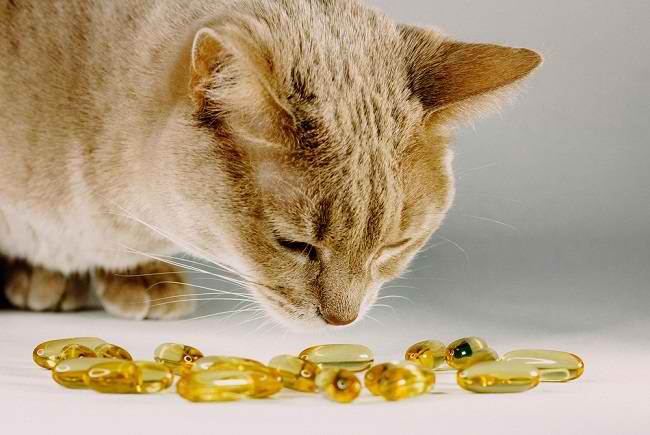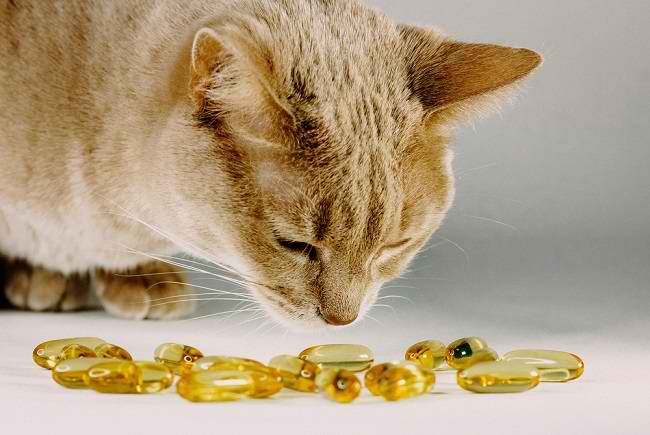Giving cat vitamins can be an effective way to meet your cat’s nutritional needs. In addition to keeping the cat’s body healthy, vitamins can also make the cat grow well.
One of the main functions of cat vitamins is to facilitate and increase metabolic processes in the cat’s body. However, in addition to vitamins, cats also need other nutrients, such as carbohydrates, protein, fat, minerals, and water.

Actually vitamins can be found in cat food, but sometimes the amount can not meet the nutritional needs of every cat. This is the reason some people give extra vitamins to their pet cats.
In addition, when a cat is sick, he may also have a lack of appetite and this can put him at risk for nutritional deficiencies, including vitamins.
Types of cat vitamins and their benefits
Generally, the types and benefits of cat vitamins are not much different from human vitamins. Even so, you are not recommended to give human vitamins to cats because there is a risk of side effects that actually endanger the cat’s health.
Therefore, it is recommended that you provide vitamins that are intended for animals or cats.
Here are some types of cat vitamins and their benefits:
1. Vitamin A
The recommended intake of vitamin A for adult cats is about 64 micrograms per day. Vitamin A is useful for maintaining healthy eyes, skin, body immunity, and the growth of cats’ teeth and bones.
If you don’t get enough vitamin A, your cat may develop a vitamin A deficiency or deficiency. This can cause your cat to develop certain health problems, such as susceptibility to infections, conjunctivitis, or dry eyes.
2. Vitamin B complex
Vitamin B consists of various types, namely vitamin B1 (thiamine), vitamin B2 (riboflavin), vitamin B3 (niacin), vitamin B5 (pantothenic acid), vitamin B6 (pyridoxine), vitamin B7 (biotin), vitamin B9 (folic acid). ), and vitamin B12.
These various B vitamins have important roles for cat health, such as supporting the digestion of protein, fat, and carbohydrates, as well as launching their body’s metabolism.
In addition, B vitamins can support the cat’s growth process, including supporting the formation of body cells and tissues, such as red blood cells.
3. Vitamin C
Vitamin C is useful for maintaining the immune system and metabolism, as well as an antioxidant that can protect the cat’s body from oxidative stress, for example due to exposure to free radicals.
The recommended intake of vitamin C for cats is 150-500 mg per day, depending on the cat’s weight and health condition.
4. Vitamin D
The next cat vitamin is vitamin D, which is a vitamin that is useful for increasing calcium and phosphorus levels in the blood. This vitamin is responsible for supporting growth and maintaining healthy bones and teeth.
Vitamin D deficiency can cause cats to develop rickets and osteomalacia. To prevent this, cats need vitamin D intake of 0.4 micrograms per day.
5. Vitamin E
The amount of vitamin E that cats need to get every day is about 2.5 mg. In addition to functioning as an antioxidant, vitamin E is also needed by cats to absorb vitamin A and vitamin D in their bodies.
Lack of this vitamin can make cats more susceptible to various health problems, such as infections, skin diseases, underweight, and growth disorders.
6. Vitamin K
Vitamin K plays a role in the blood clotting process and supports wound healing. This vitamin can occur naturally in the cat’s digestive system, but sometimes cats also need additional vitamin K intake from food or supplements.
The amount of vitamin K a cat needs to get is about 80 micrograms per day.
Various types of cat vitamins can be obtained through the provision of a balanced nutritious diet. However, under certain conditions, such as when they are sick, malnourished, or have recently undergone surgery, a cat may need additional vitamin intake through supplements.
It is important to remember that giving your cat additional vitamin supplements should be in accordance with the veterinarian’s recommendations. This is to prevent vitamin overdose, especially for fat-soluble vitamins.
Therefore, you are advised to ask your vet first before giving cat vitamins. That way, giving vitamins will be more appropriate and in accordance with the condition of your pet cat.











